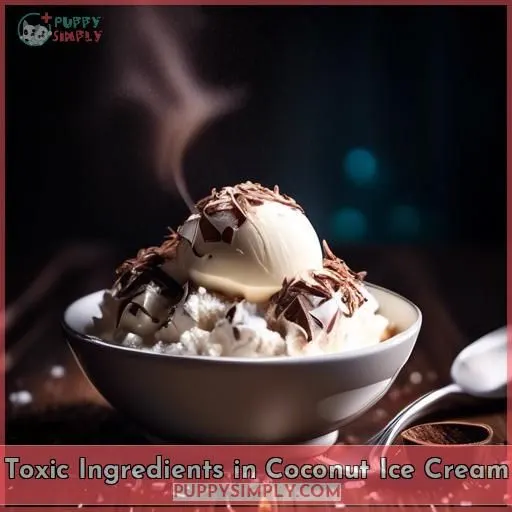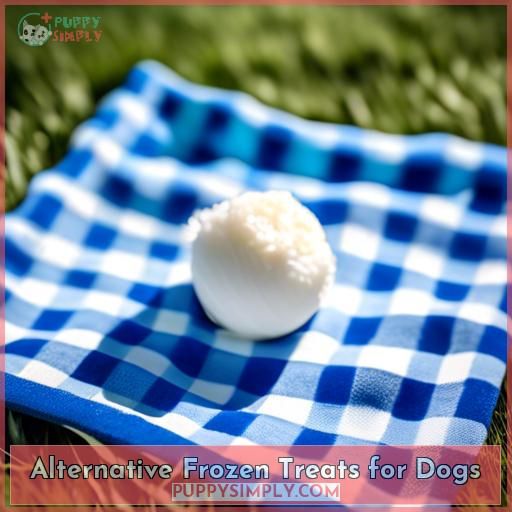This site is supported by our readers. We may earn a commission, at no cost to you, if you purchase through links.
 Craving a cool treat on a hot day? Think twice before sharing your coconut ice cream with Fido.
Craving a cool treat on a hot day? Think twice before sharing your coconut ice cream with Fido.
While coconut itself is not toxic for dogs, many coconut ice cream varieties contain ingredients harmful to pups, like chocolate or xylitol.
Discover the truth about this tropical delight’s safety for your furry friend by reading on.
Table Of Contents
- Key Takeaways
- Can Dogs Eat Coconut Ice Cream ?
- Can Dogs Eat Coconut Ice Cream?
- Toxic Ingredients in Coconut Ice Cream
- High Fat Content in Coconut Ice Cream
- Alternative Frozen Treats for Dogs
- How Much Coconut Ice Cream Can Dogs Have?
- Can Dogs Eat Vanilla Ice Cream?
- Can Dogs Eat Chocolate Ice Cream?
- Can Dogs Eat Mango Ice Cream?
- Can Dogs Eat Butter Pecan Ice Cream?
- Are Ice Cream Cones Safe for Dogs?
- Frequently Asked Questions (FAQs)
- What are the health benefits of coconut for dogs?
- Can dogs consume coconut milk and ice cream in large quantities?
- Are there any specific brands of coconut ice cream safe for dogs?
- How can I make homemade coconut ice cream for my dog?
- What should I do if my dog accidentally consumes coconut ice cream with toxic ingredients?
- Conclusion
Key Takeaways
- Coconut ice cream is not recommended for dogs due to the potential presence of toxic ingredients, such as chocolate or xylitol, and its high-fat content, which can lead to pancreatitis and obesity.
- Dogs can consume small amounts of unsweetened coconut milk, shredded coconut, and coconut oil, which offer various health benefits, but these should be given in moderation due to their high-fat content.
- Alternative frozen treats for dogs include ice cubes, dog-friendly ice cream, frozen smoothies made from safe fruits and vegetables, and low-fat, plain Greek yogurt.
- Always consult with a veterinarian before introducing new foods into a dog’s diet and monitor their reactions to ensure there are no adverse effects.
Can Dogs Eat Coconut Ice Cream ?
No, dogs should not eat coconut ice cream as it may contain toxic ingredients like xylitol and is high in fat, which can cause health issues. Coconut ice cream is not a healthy treat for dogs and alternatives should be considered.
Can Dogs Eat Coconut Ice Cream?
You might think coconut ice cream is a cool treat to share with your furry friend, but hold that spoon!
While dogs can enjoy coconut in moderation, coconut ice cream is a different scoop. It’s a tropical delight for humans, but for dogs, it’s a minefield of potential toxic ingredients like xylitol.
Instead, look for safe alternatives that won’t upset their tummy or lead to weight woes. If your pooch isn’t allergic to coconut, a lick or two of natural, unsweetened coconut milk ice cream could be okay.
Toxic Ingredients in Coconut Ice Cream
Toxic Ingredients in Coconut Ice Cream
Coconut ice cream may seem like a healthy treat for your furry friend, but it’s crucial to be aware of the potential hazards.
- Sugar content: Many coconut ice creams contain high levels of sugar, which can lead to digestive upset and weight gain in dogs.
- Lactose intolerance: Some coconut ice creams may contain dairy, which can cause lactose intolerance in dogs, resulting in digestive upset.
- Portion control: Even if your dog tolerates dairy, it’s essential to limit their intake of coconut ice cream to avoid overindulgence.
- Dairy alternative: If your dog is lactose intolerant, opt for coconut milk or coconut oil as a dairy alternative.
- Coconut oil vs. coconut water: While coconut oil can be beneficial for dogs, coconut water is high in potassium and should be avoided.
- Coconut milk: Choose natural, organic coconut milk products for your dog.
- Ice cream cones: Avoid ice cream cones as they contain sugar and fat.
To ensure your dog’s safety, always read the ingredient list before purchasing coconut ice cream. And remember, it’s best to consult with your veterinarian before introducing any new foods into your dog’s diet.
High Fat Content in Coconut Ice Cream
When it comes to coconut ice cream for your furry friend, it’s crucial to be aware of the high-fat content it contains.
Dogs, just like humans, can face issues with weight gain and even pancreatitis from consuming too much fat.
Coconut milk, a common ingredient in coconut ice cream, is particularly rich in fat, which can lead to health complications for your dog.
Pancreatitis, a painful medical condition, can be triggered by high-fat foods like coconut ice cream.
It’s essential to keep an eye on your dog’s diet and ensure that treats like coconut ice cream are given in moderation to prevent any adverse effects on their health.
Alternative Frozen Treats for Dogs
In the previous section, we delved into the high-fat content of coconut ice cream, shedding light on the potential risks for our furry friends.
Now, let’s explore some exciting alternatives that will keep your dog cool and satisfied during those hot summer days.
When it comes to frozen treats for dogs, the options are endless!
From simple ice cubes made of water or chicken broth to specialized dog-friendly ice cream, there’s something for every pup’s taste buds.
You can also get creative with frozen smoothies using safe fruits and veggies like berries, bananas, and cucumbers.
For a creamy indulgence, consider offering low-fat, plain Greek yogurt in moderation.
How Much Coconut Ice Cream Can Dogs Have?
When it comes to feeding your furry friend coconut ice cream, moderation is key to keep them safe and happy.
- Portion Control: Limit coconut ice cream to small servings occasionally to avoid any tummy troubles.
- Watch for Reactions: Keep an eye out for allergic reactions or signs of lactose intolerance.
- Consider Alternatives: Explore homemade options like vanilla treats or peanut butter delights for a safer indulgence.
Can Dogs Eat Vanilla Ice Cream?
When it comes to treats for your furry friend, exploring options like vanilla ice cream can be a delightful experience.
While coconut ice cream may not be the best choice due to its high fat content, vanilla ice cream can be a safer alternative if your dog tolerates dairy well.
If you’re looking for specialized treats, dog ice cream or homemade peanut butter dog popsicles can be excellent choices to cater to your pup’s nutritional needs while keeping their taste buds happy.
Can Dogs Eat Chocolate Ice Cream?
Can Dogs Eat Chocolate Ice Cream?
Chocolate ice cream is a popular treat for humans, but it can be dangerous for dogs. Chocolate contains theobromine and caffeine, both of which are toxic to dogs. Theobromine is a stimulant that can cause vomiting, diarrhea, seizures, and even death in dogs.
Caffeine can also cause similar symptoms, and both substances can lead to heart problems and muscle tremors.
Some chocolate ice creams may not contain actual chocolate but use flavoring instead. However, it’s still not worth the risk to feed these to your dog. The best way to ensure your dog’s safety is to avoid chocolate ice cream altogether.
Instead, opt for dog-friendly treats that are specifically designed for their nutritional needs and are safe for them to consume.
Can Dogs Eat Mango Ice Cream?
Mango ice cream can be a refreshing treat for your dog, but it’s essential to prepare it correctly. The safety and benefits of this popular treat depend on how it’s prepared for your dog. If you use plain yogurt with no sweeteners, especially artificial sweeteners like xylitol, which is highly toxic to your dog, mango ice cream can be a cool and hydrating snack on a hot summer day.
However, if you’re considering other frozen treats for your dog, there are several options to choose from.
Alternative frozen treats for dogs include ice to lick or chew, made of water or no-salt chicken broth, dog-specific ice cream, frozen smoothies from safe fruits and vegetables like berries, bananas, and cucumbers, and low-fat, plain Greek yogurt in moderation.
These treats can be a healthier alternative to mango ice cream, especially if you’re concerned about the sugar content or potential allergies.
When it comes to feeding mango to your dog, it’s crucial to follow some guidelines. Only feed the mango flesh, as the skin and pit can pose choking hazards and are hard for dogs to digest. Start with small amounts and avoid exceeding 10% of your dog’s daily caloric intake.
If your dog has diabetes or is overweight, consult your veterinarian before offering mango as a treat.
In conclusion, while mango ice cream can be a refreshing treat for your dog, it’s essential to prepare it correctly and consider alternative frozen treats that are healthier and safer for your furry friend.
Can Dogs Eat Butter Pecan Ice Cream?
Can Dogs Eat Butter Pecan Ice Cream?
Butter pecan ice cream is a popular flavor that many people enjoy, but is it safe for dogs to eat? The answer is no, dogs shouldn’t eat butter pecan ice cream, as it contains ingredients that can be harmful to them.
First, butter pecan ice cream often contains pecans, which can be a choking hazard for dogs and may also cause digestive issues. Additionally, butter pecan ice cream may contain artificial flavors, which can be difficult for dogs to digest and may cause digestive upset.
Furthermore, butter pecan ice cream typically contains high levels of sugar and fat, which can lead to weight gain and other health problems in dogs. It may also contain xylitol, a sugar substitute that’s toxic to dogs and can cause liver failure.
If you want to give your dog a treat, there are better options available. You can try homemade alternatives, such as frozen bananas or yogurt, or look for dog-friendly ice cream options that are specifically formulated for canine consumption.
These products are made with safe ingredients and are designed to be easier for dogs to digest.
In conclusion, while it may be tempting to share your butter pecan ice cream with your dog, it’s best to avoid giving them this treat. Instead, opt for healthier and safer alternatives that are specifically designed for dogs.
Are Ice Cream Cones Safe for Dogs?
Sure, ice cream cones can be a fun treat for your dog, but it’s important to keep a few things in mind. First, ice cream cones are high in sugar, which can lead to digestive upset or worse in dogs. Second, if the ice cream cone contains xylitol, a sugar substitute found in many sugar-free snacks, it can be toxic to dogs and cause symptoms like vomiting, seizures, and even liver failure.
To make ice cream cones a safer treat for your dog, consider these alternatives:
- Homemade dog-friendly ice cream: You can make your own dog-friendly ice cream using ingredients like yogurt, banana, and pumpkin. This way, you can control the ingredients and ensure that they’re safe for your dog.
- Frozen fruit: Frozen fruits like blueberries, watermelon, or honeydew can be a refreshing and healthy treat for your dog. Just be sure to remove any seeds or pits, as they can be a choking hazard.
- Plain yogurt: Plain yogurt is a good source of probiotics and can be a healthy treat for your dog in moderation. Just be sure to avoid yogurts with added sugars or artificial sweeteners.
When it comes to feeding your dog ice cream cones, it’s important to keep in mind their daily calorie intake. Treats shouldn’t exceed 10% of your dog’s daily calories, so be sure to adjust their regular meals accordingly.
If you do decide to give your dog an ice cream cone, make sure it’s made from natural ingredients and avoid any toxic ingredients like xylitol. You can even make your own dog-friendly ice cream cone using a simple recipe with ingredients like flour, water, and honey.
In summary, while ice cream cones can be a fun treat for your dog, it’s important to keep in mind their high sugar content and the potential for toxic ingredients. Consider alternative frozen treats like homemade dog-friendly ice cream or frozen fruit, and always keep your dog’s daily calorie intake in mind.
Frequently Asked Questions (FAQs)
What are the health benefits of coconut for dogs?
You’re right, coconut provides dogs antioxidants, anti-inflammatory benefits, healthy fats, fiber, and vitamins that strengthen immunity and digestion.
Can dogs consume coconut milk and ice cream in large quantities?
Dogs shouldn’t overindulge on coconut milk or ice cream. While coconut has benefits, large amounts can cause digestive upset and weight gain due to the high fat content.
Are there any specific brands of coconut ice cream safe for dogs?
Sadly, most coconut ice cream brands aren’t dog-safe due to sugars, fats, or artificial ingredients. For pups’ safety, it’s best to avoid human coconut ice creams as occasional treats.
How can I make homemade coconut ice cream for my dog?
Whip up a puree of coconut milk, honey, and peanut butter. Freeze it in bite-sized portions for a nutritious, frosty treat your pup will go mutts over!
What should I do if my dog accidentally consumes coconut ice cream with toxic ingredients?
If your pup consumes toxic coconut ice cream, call your vet immediately. Chocolate, xylitol, and other ingredients can be life-threatening.
Conclusion
One bad apple spoils the whole bunch. While coconut itself is non-toxic for dogs, many coconut ice cream varieties contain harmful ingredients like chocolate or xylitol. Your pup’s safety should come first when considering can dogs eat coconut ice cream.
Opt for dog-friendly frozen treats instead to keep your furry companion healthy and happy.















